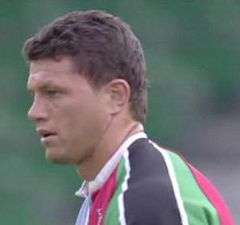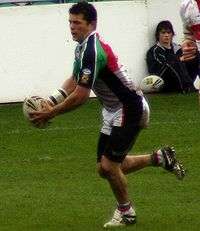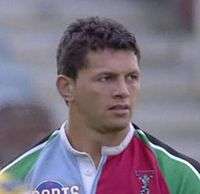Henry Paul
 | ||||||
| Personal information | ||||||
|---|---|---|---|---|---|---|
| Full name | Henry Rangi Paul | |||||
| Born | 10 February 1974 Tokoroa, New Zealand | |||||
| Height | 5 ft 11 in (1.80 m) | |||||
| Weight | 15 st 3 lb (97 kg) | |||||
| Playing information | ||||||
| Rugby league | ||||||
| Position | Five-eighth, Halfback, Hooker | |||||
| Club | ||||||
| Years | Team | Pld | T | G | FG | P |
| Te Atatu Roosters | ||||||
| Waitakere City Raiders | ||||||
| 1993–94 | Wakefield Trinity | 24 | 111 | |||
| 1994–98 | Wigan | 147 | 550 | |||
| 1999–01 | Bradford Bulls | 100 | 960 | |||
| 2006–08 | Harlequins RL | 63 | 240 | |||
| Total | 334 | 0 | 0 | 0 | 1861 | |
| Representative | ||||||
| Years | Team | Pld | T | G | FG | P |
| 1995–01 | New Zealand | 24 | 121 | |||
| Rugby union | ||||||
| Position | Inside centre | |||||
| Club | ||||||
| Years | Team | Pld | T | G | FG | P |
| 1996 | Bath | 6 | 0 | 0 | 0 | 0 |
| 2001–06 | Gloucester | 116 | 20 | 357 | 2 | 802 |
| 2008–10 | Leeds Carnegie | 37 | 2 | 3 | 16 | 16 |
| 2010–11 | Rotherham | 5 | 0 | 0 | 0 | 0 |
| Total | 164 | 22 | 360 | 18 | 818 | |
| Representative | ||||||
| Years | Team | Pld | T | G | FG | P |
| 2002–04 | England | 6 | 0 | 3 | 0 | 6 |
| England sevens | ||||||
Henry Paul (born 10 February 1974) is a former dual code rugby league and rugby union international. Paul represented New Zealand in rugby league and England in rugby union and rugby sevens. He once held the world record for the most consecutive kicks on the field, a record now held by Neil Jenkins.
Paul's usual position is at loose forward/Lock. He can also operate in the back row. He made his name as a dynamic stand-off. He is currently playing at centre for rugby union, and has previously played at fly-half.
He currently lives in Leeds with his girlfriend, close to his brother Robbie Hunter-Paul, also a New Zealand international.
Early career
Born in Tokoroa, New Zealand, Paul started playing rugby union at the age of three for Ponsonby Rugby Football Club and then rugby league for the Te Atatu Roosters. Later, during his time at Rutherford High School (1990), he became a highly talented player at under-16 level, where he led his team to break many Auckland club rugby league team and individual records. The following year, Paul moved to the Point Chevalier Pirates where he continued to harness his talents as one of the most talented junior rugby league players in the history of Auckland Rugby League.
In the 1992 season he returned to Te Atatu, debuting in their senior premier team at just 18 years of age where he played an integral part in his team making the pinnacle of the Auckland Rugby League finals – the Fox Memorial Cup. That off season, Paul was selected as a utility player for the under-19 Auckland side, playing a major part in his team winning the national tournament. Following that success, Paul was selected as the Junior Kiwis captain to tour England that same off season.
Paul led by example when his team looked "out of sorts", guiding them to memorable victories against their Great Britain counterparts. His form was so inspiring that he earned full New Zealand representative honours on the same tour, when the senior team the (New Zealand Kiwis) hit an injury crisis on a corresponding tour of Britain. Paul, at just 18 years of age, gained his test debut as a substitute against France.
Wakefield Trinity
Paul's form on the Junior, and then subsequently New Zealand team tour, did not go unnoticed by astute talent scouts in England and in the off season of 1993/94 he joined the Wakefield Trinity Wildcats (Heritage #1052) of the English Rugby Football League Championship and was highly impressive.[1]
Back to New Zealand
He returned to New Zealand for the 1994 season, playing five matches for the Waitakere City Raiders in the new Lion Red Cup. He originally signed for the new Auckland Warriors club who were to enter the Australian Rugby League in 1995 but they released him as part of a deal that allowed Andy Platt to join Auckland from Wigan.
Wigan

Paul joined Wigan Warriors for the 1994–95 season and quickly established himself in the squad. At the end of Super Leagues first season, he was named at stand-off half in the 1996 Super League Dream Team. He played at stand-off half back for Wigan Warriors in their 1998 Super League Grand Final victory against Leeds Rhinos.
Henry Paul played Fullback in Wigan's 40-10 victory over Warrington in the 1994–95 Regal Trophy final during the 1994–95 season at Alfred McAlpine Stadium, Huddersfield on Saturday 28 January 1995,[2] and played Stand-off/Five-eighth, and scored 2-tries and 4-conversions in the 25-16 victory over St. Helens in the 1995–96 Regal Trophy final during the 1994–95 season at Alfred McAlpine Stadium, Huddersfield on Saturday 13 January 1996.[3]
Bradford
In September 1998, at the end of his contract he moved to the Bradford Bulls. Paul played for Bradford Bulls at stand-off half back and scored his team's sole try and goal in the 1999 Super League Grand Final which was lost to St Helens RLFC. Paul was selected for the New Zealand team to compete in the end of season 1999 Rugby League Tri-Nations tournament. In the final against Australia he partnered his brother Robbie in the halves, kicking six goals in the Kiwis' 22-20 loss. He helped beat his former club Wigan in the 2001 Super League Grand Final. When he was at Bradford he set a goalkicking record for consecutive goals (35), as well as for points in a season at the club.[4]
He won the Lance Todd Trophy for his performance in the 2000 Challenge Cup victory over the Leeds Rhinos.
Paul played for the Bradford Bulls as his brother Robbie's halves partner, kicking four goals and one drop goal in their 2001 Super League Grand Final victory against the Wigan Warriors.
International rugby league
In international rugby league he received 23 caps for New Zealand.[5] Upon his return from rugby union in 2006 he qualified for both New Zealand and Great Britain.[6][7]
Move to rugby union
Paul had previously spoken to National Rugby League club the Canterbury Bulldogs and Super 12 clubs the Auckland Blues and the Waikato Chiefs. However, he was finally tempted away from the Bradford Bulls, to play rugby union for Gloucester, by Philippe Saint-André and Tom Walkinshaw.[8][9]
He had a dream début for Gloucester scoring 28 points against Caerphilly. A prolific goal kicker and a gifted runner and distributor, Paul began a four-year contract at Kingsholm in 2001 and won an England A national squad selection after just one game for the Cherry and Whites.[10][11]
His early days at Gloucester were turbulent, compared to the unqualified domestic success that he had in later years at the club. He was even linked with a return his former club the Bradford Bulls, the Widnes Vikings and a move to NRL club the Canberra Raiders and a reunion with former coach at Bradford Matthew Elliott.[12][13][14]
Having experimented with being a fullback, and fly-half he settled into the Inside centre position and his long passing stood well with Gloucester's style of play. He had his best year with Gloucester Rugby in 2004 when he won the club's season ticket holders’ Player of the Year award and was also nominated for the Zurich Premiership Player of the Year award alongside Bruce Reihana, Mark Robinson, Simon Shaw and Mark van Gisbergen. Whilst at Gloucester he started in the 2003 Powergen Cup Final in which Gloucester defeated Northampton Saints.[15]
England international
With his switch to rugby union, he controversially decided to play for England (due to the fact he could only play for the New Zealand national side if he played in Super 12) rather than New Zealand. Although he was born in New Zealand, he qualified for England through his Liverpudlian grandfather.[8]
He won his first England cap as a replacement against France in the 2002 Six Nations Championship, but has only managed to win a handful of caps since then, mostly during the 2004 Six Nations Championship, coming off the bench in Rome and at Murrayfield. He was also considered Man of the Match for England A against France A in March 2004 – with five penalties and a conversion.
He excelled for the England Sevens side and was a member of the 2002 Commonwealth Games and 2006 Commonwealth Games squads, winning a silver medal in 2006. Paul also was the acting captain of England Sevens when it won the USA Sevens tournament in 2006. He was also a member of the England A team that won the 2003 Churchill Cup in Canada and returned there again on the 2004 Churchill Cup tour.
Harlequins RL

On the 27 April 2006, Paul agreed a move back to rugby league joining Harlequins Rugby League. The London side beat off competition from the Penrith Panthers to secure his signature.[16]
His brother Robbie Paul played rugby league for Salford City Reds, having played with Paul at Bradford Bulls before a spell at Huddersfield Giants. Paul faced Robbie in his first game back in 2006's Super League XI on 29 April 2006.
Man of Steel Awards controversy
In 2007 Paul appeared drunk at the Super League's Man of Steel Award's dinner. Paul had slurred his acceptance speech when he received the Frontline Fairplay Index Award, awarded for good behaviour on the field, on behalf of the club.[17][18][19][20] and Paul subsequently apologised for his actions.[21][22][23][24]
Leeds Carnegie
He had been linked with a return to rugby union with Leeds Carnegie.[25] But the move was initially seen as unlikely due to the team being relegated from the 2007-08 Guinness Premiership.[26][27]
The 34-year-old switched codes and joined Leeds' National League One campaign at the end of 2008's Super League XIII.[28][29] Henry played at centre and fly-half for the two years at Carnegie. While in the RFU Championship he captained the side to their biggest victory in Carnegie history against Manchester and captained the side a numerous times, getting Man of the Match on several occasions. He helped Carnegie get promoted to the Premiership.
Coaching career
Paul was released from Leeds in 2010 to embark on his coaching career as he signed up as the assistant coach of Russia.[30]
Paul started his role coaching Russia at the 2010 Churchill Cup in the United States. He then coached them during the 2010-2012 European Nations Cup First Division and at the 2011 Churchill Cup held in England. Russia played some brilliant attacking rugby in their games in the Churchill Cup, coming close against Italy A and the United States.
Henry took the side to the 2011 Rugby World Cup with Kingsley Jones as head coach. Russia's results did not provide a fair reflection of some of the rugby they produced. The ITV coverage stated that Russia produced two of the best tries of the weekend against Ireland, attributing to Henry's impressive coaching skills.
Rotherham Titans
In 2010, Paul signed for RFU Championship side the Rotherham Titans.[31]
Paul did not stay long at the club due to work commitments with Russia putting him out of the country for most of the year.
Bradford & Bingley RFC
In 2012 Paul joined Bradford and Bingley RFC as Director of Rugby. Their first game of the 2014/15 is away to Dinnington.[32] [33]
References
- ↑ "Paul May Be Back For More". Sportinglife. 2008-02-22. Retrieved 2008-02-22.
- ↑ "28th January 1995: Warrington 10 Wigan 40 (Regal Trophy Final)". wigan.rlfans.com. 31 December 2014. Retrieved 1 January 2015.
- ↑ "13th January 1996: St Helens 16 Wigan 25 (Regal Trophy Final)". wigan.rlfans.com. 31 December 2014. Retrieved 1 January 2015.
- ↑ "Paul's conversion pays dividends". BBC. 2001-07-25. Retrieved 2008-02-22.
- ↑ "Kiwis close door on Paul return". BBC. 2006-05-23. Retrieved 2008-02-22.
- ↑ "Paul stays silent on Lions talk". BBC. 2006-05-05. Retrieved 2008-02-22.
- ↑ "Paul in frame for Great Britain". BBC. 2006-05-02. Retrieved 2008-02-22.
- 1 2 "Bulldogs withdraw Paul offer". BBC. 2001-07-11. Retrieved 2008-02-20.
- ↑ "Walker on the warpath". BBC. 2001-07-25. Retrieved 2008-02-20.
- ↑ "Paul must wait for debut". BBC. 2001-11-06. Retrieved 2008-02-20.
- ↑ "Paul gets England 'A' call". BBC. 2002-01-30. Retrieved 2008-02-20.
- ↑ "Raiders hungry for Henry". BBC. 2002-02-04. Retrieved 2008-02-20.
- ↑ "McDermott: Time to forget Henry". BBC. 2002-02-18. Retrieved 2008-02-20.
- ↑ "Paul rejects Widnes approach". BBC. 2003-02-18. Retrieved 2008-02-20.
- ↑ "Gloucester given hope by cup win amid financial ruins". The Guardian. 7 April 2003. Retrieved 8 September 2016.
- ↑ "Paul returns to league with Quins". BBC. 2006-04-27. Retrieved 2008-02-19.
- ↑ "Drunk Paul in gong rap". London: Sun. 2007-10-10. Retrieved 2007-10-10.
- ↑ Wilson, Andy (2007-10-10). "Paul in trouble after appearing drunk at show". London: Guardian. Retrieved 2007-10-10.
- ↑ "Paul's night of shame". Telegraph and Argus. 2007-10-10. Retrieved 2007-10-10.
- ↑ "Henry Paul's booze shame". Mirror. 2007-10-10. Retrieved 2007-10-10.
- ↑ "Paul Says Sorry For Faux Pas". Sportinglife. 2007-10-10. Retrieved 2007-10-10.
- ↑ "Quins accept Paul apology". Sky Sports. 2007-10-10. Retrieved 2007-10-10.
- ↑ "Quins RL support Henry Paul". Quins. 2007-10-10. Retrieved 2007-10-10.
- ↑ "Quins Harlequins accept Paul's apology". BBC. 2007-10-10. Retrieved 2007-10-10.
- ↑ "Paul ready for Leeds code switch". BBC. 2008-04-22. Retrieved 2008-04-22.
- ↑ "Paul to cross divide again". Sportinglife. 2008-04-22. Retrieved 2008-04-22.
- ↑ "Paul set for another switch". Sky Sports. 2008-04-22. Retrieved 2008-04-22.
- ↑ "Paul completes Leeds code switch". BBC. 2008-04-23. Retrieved 2008-04-23.
- ↑ "Henry Paul to leave the Capital". Quins. 2008-04-23. Retrieved 2008-04-23.
- ↑ Paul handed Russian role skysports.com, 7 June 2010.
- ↑ "Bedford's backing for Paul". Sky Sports. 2010-07-08. Retrieved 2010-07-08.
- ↑ http://www.pitchero.com/clubs/bradfordandbingleyrfc/news/north-1-east-fixtures-1227644.html
- ↑ http://www.thetelegraphandargus.co.uk/sport/9932191.Henry_Paul_joins_Bees/
External links
- Henry Paul Wigan Career Page on the Wigan RL Fansite.
- Leeds Carnegie profile
- Quins RL profile
- England profile
- Passion for Sport 2001
- Kiwis too strong for Kumuls
- The Millennium Masters – Substitutes
- Bull Masters – Henry Paul